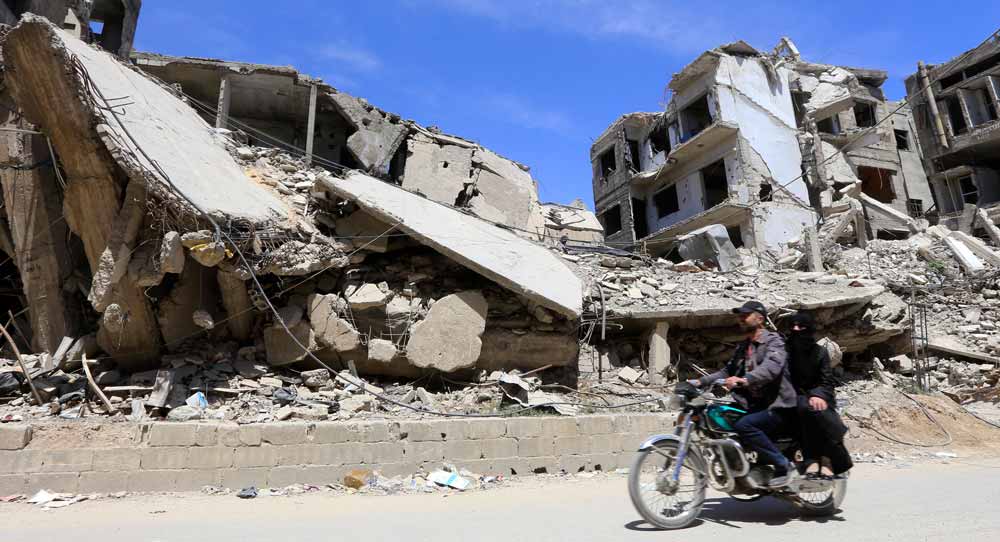Germany likes to pride itself among European countries as one of the main supporters of disarmament, of curbing the proliferation of nuclear weapons, and of protecting existing conventions such as the prohibition of chemical weapons.
But when, not for the first time, Syrian President Bashar al-Assad’s regime allegedly dropped a barrel bomb containing poison gas, this time on the town of Douma, the United States, France, and Britain responded. They attacked Assad’s chemical weapons plants. Germany remained on the sidelines. Angela Merkel had categorically ruled out any German involvement.“Germany will not be militarily involved,” Merkel said. “We recognize and we support the fact that every effort is being made to signal that the use of chemical weapons is unacceptable.” Once the Western strikes had taken place, Merkel said that “the military response was successful and appropriate.”
It’s hard to know what “successful” and “appropriate” means given the appalling suffering meted out by the Assad regime and the rebels on civilians and how Assad’s military infrastructure is still intact. “We make it easy for ourselves, letting the others do the dirty work,” said former German defense minister Karl-Theodor zu Guttenberg from Bavaria’s conservative Christian Social Union.
What is clear is that German foreign policy with regard to Syria, Russia, and Iran is becoming increasingly shortsighted.
Take Syria. No Western country emerges well from this seven-year and counting war—leaving aside Merkel’s decision to take in over one million refugees fleeing the violence.
The vacuum left by the United States and European countries to keep out of the war, at least formally, has been filled principally by Iran and Russia. Without their military support, the Assad regime would have had already collapsed.
Iran and Russia are now intent on carving out an arc of influence in this part of the Middle East. No wonder Israel is extremely worried. Since the West isn’t going to rein in Iran, Israel has been forced to launch air attacks on Iranian targets in Syria to try and stop Tehran from establishing a permanent foothold close to its border.
Germany’s response to Iran is similar to France’s and the EU’s. All three have been fawning toward Iran.
For Merkel, French President Emmanuel Macron and the EU’s foreign policy chief, Federica Mogherini, saving the Iran nuclear deal in the wake of threats by the Trump administration to tear it up is their priority.
It is rare to hear, if at all, EU governments speak out against Iran’s support of Hezbollah, of Hamas, and how it is propping up the Assad regime. Not to mention the fact that Iran refuses to accept Israel’s right to exist.
As for Russia’s role in Syria: in addition to its cyberattack on the German foreign ministry and the parliament, Russian meddling in elections in EU member states, and the poison attack on Sergei Skripal, Merkel’s coalition of Christian Democrats and Social Democrats is floundering. There is no clarity about how to respond to Russian interference.
The Christian Social Union—the sister party of Merkel’s Christian Democrats—have repeatedly questioned EU sanctions on Russia and their effectiveness. German President Frank-Walter Steinmeier, a Social Democrat, and Michael Roth, Germany’s minister for Europe, have each warned against Germans demonizing Russia.
Heiko Maas, Germany’s Social Democrat foreign minister, who has been tougher than his party colleagues on Russia since taking office a few weeks ago, said there can be no military solution, only a political solution, to the war in Syria.
“It is time, I think, to point out that we expect constructive contributions from the Russian side, including on the Syrian conflict. And also that they don’t always simply protect al-Assad,” he said. “Whether we like it or not, this conflict cannot be solved without Russia.” But on what, and whose, terms?
Russia has repeatedly vetoed resolutions by the United Nations Security Council over Syria, leaving it toothless. Macron didn’t seek support by the EU for France’s missile attacks on Syria. The UN and the EU are competing for helplessness in responding to the war.
As for Berlin, if it is going to sit on the sidelines when it comes to upholding the ban on chemical weapons, it could adopt a much stronger policy toward Russia.
Merkel should, for example, abandon the Nord Stream 2 pipeline that is being built by a consortium of German and other European energy companies led by Gazprom. Merkel has repeatedly described the project as a commercial one. It isn’t. It is a highly political one. The pipeline will not only deny Ukraine important transfer fees for sending Russian gas to Europe; it will increase Germany’s dependence on Russian gas and tie German energy companies even closer to the Kremlin.
Also, statements by several Social Democrats and Christian Social Union politicians about the need to have a dialogue with Russia tend to forget two things. First, Russia’s involvement in Syria has prolonged the war and helped create a refugee crisis. Furthermore, when it comes to Ukraine, cyberattacks, and the disinformation war, Russia is the aggressor. This is a word rarely, if ever, used by Mogherini, by Steinmeier, or by other officials who yearn for a return to business as usual with Vladimir Putin. Merkel should put the record straight—and match it with deeds to put some teeth on German and European foreign policy. Otherwise, helplessness will turn into irrelevancy.








